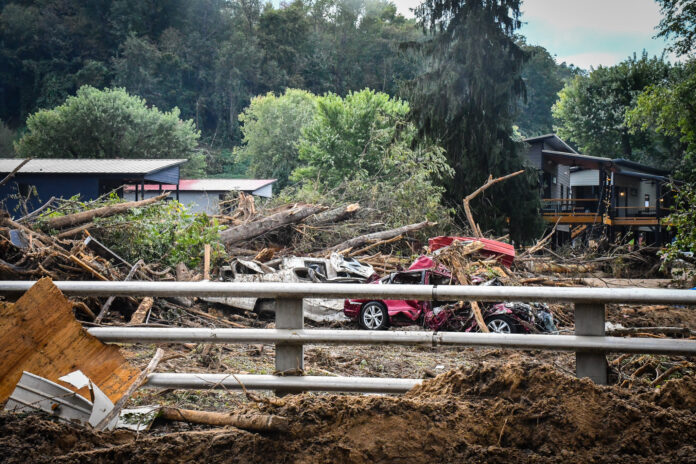In the wake of any disaster, cash is crucial, and the ability to move money quickly to get it in the hands of those who need it most is essential.
When Hurricane Helene hit, the North Carolina Community College System (NCCCS) and the North Carolina Community College Foundation (NCCCF) quickly mobilized to create the Hurricane Helene Community College Response and Recovery Fund. The idea was to provide a starting point and central hub for companies and individuals to donate to support colleges. The foundation would then distribute the funds to the affected community colleges to help colleges rebuild and provide critical resources to students and staff.
Helene impacted 14 of the state’s community colleges, representing more than 6,000 faculty and staff and nearly 74,000 students.
Once the fund was set up, money quickly started coming in from all over, including generous donations from the John M. Belk Endowment, Blue Cross and Blue Shield of North Carolina, and Wells Fargo. The Lenoir Community College Foundation immediately gave $20,000 to help the colleges in the western part of the state, stating that when their college had a similar disaster years ago, other colleges stepped up to help. Nearly 200 donors gave $5-$249 to the relief fund, including individual community college students from other parts of the state. In total, the foundation said 256 donors gave to the Hurricane Helene recovery fund.
“It was really special to see the care and concern across the state for our western community colleges,” Katie Loovis, NCCCF executive director, said.
NCCCS President Dr. Jeff Cox said the system created a simple and streamlined process for assessing and distributing funds. College presidents send Cox a summary of how their college intends to use the different funding streams. Then, Cox sends the approvals to Loovis, who works with her team to issue the money to colleges.
Haywood Community College directed the foundation relief funds to their Haywood Strong Scholarship, the college said. The scholarship is used to assist students during times of financial hardship, whether it be from economic or natural disasters. Students impacted by Helene received assistance for tuition, fees, books, and computers. Funds were also used to provide emergency financial assistance for students who needed housing, food, car and household repairs, and clothing.
Blue Ridge Community College used some of the funds from the hurricane relief fund to extend their marketing and financial aid capacity, according to the college, keeping students enrolled and connecting them to workforce opportunities post Helene.
Like Haywood and Blue Ridge, Isothermal Community College used their funding to support students who suffered losses due to the storm.
In the weeks and months after Helene, loss of communication and road closures also created ongoing issues for many across western North Carolina.
In response, the system coordinated with the State Highway Patrol to deliver Starlinks and generators by helicopter to several impacted colleges. Cox personally delivered a chainsaw and Starlink to Mayland Community College President Dr. John Boyd.

As of February 2025, the foundation has distributed $560,000 across four rounds of funding to the affected community college.
“I think we can say that the fund was a successful example of what’s possible when we work together as a system and leverage the statewide foundation as a resource to help all of our colleges,” Loovis said.
Cox added that the foundation’s relief fund was a great supplement to the legislature’s disaster relief funding, which included emergency grants for students.
Many colleges were also fearful they would lose enrollment after Helene. Cox said the legislature stepped in to provide free tuition so that students could remain enrolled. That funding was crucial, Cox said. It was important for the colleges and their students, who were able to regain some sense of normalcy, he said.
What’s ahead for the N.C. Community College Foundation
The NCCCF has been around for nearly 40 years. But it wasn’t until a few years ago that the foundation started to refocus their efforts to bring more employers, multinational companies, and national foundations to the table.
“The role of public-private partnerships and workforce development is so important,” Loovis said. “And our foundation is uniquely positioned to be able to add value to our system, including our 58 colleges.”
The foundation is a nonpartisan, nonprofit organization whose whole mission is to support the mission of the N.C. Community College System. Loovis said the foundation supports the system in three focus areas, including fundraising to support system-wide priorities, innovating to help shine a light on innovative strategies and helping to replicate and scale those across the state, and honoring excellence and driving awareness across the system.
Starting this year, the foundation is working on a national campaign to raise support for the system. The foundation recently hired a new chief advancement officer and will begin building out their advancement office. The advancement office will be responsible for overseeing sponsorships, in-kind gifts, and annual and major giving.
Each of the 58 community colleges have their own foundations that do important fundraising for their respective colleges, Loovis said. The statewide foundation will focus on fundraising for the system office and statewide priorities.
The goal, Loovis said, is for the foundation to work collaboratively with all of the 58 college foundation heads, community college presidents, and the system office to focus on priorities where they can add unique value as a statewide foundation.
Some examples of the foundation’s work thus far include supporting the new Boost program. The program is modeled after the Accelerated Study in Associate Programs (ASAP) created by the City University of New York (CUNY) and is designed to increase completion rates and move students into high-wage, high-demand careers.
The program model is a combination of “timely and relevant supports, dedicated advising for students, and incentives to accelerate their education,” according to a system press release.
Boost will be rolled out over the next two years. The program will serve students across North Carolina, starting with eight community colleges in 2025 and seven more in 2026.
The program’s launch is supported by a $35.6 million grant from Arnold Ventures, a philanthropic organization that supports research and evidenced-based solutions to address some of the country’s most pressing issues. This is the largest private grant the system has received.
“We would love to engage other national funders to bring additional support and braid it into the Arnold Ventures partnership,” Loovis said. “That’s just one of many examples that we hope to be able to fundraise for in the coming years.”
Loovis said she also hopes to continue investing time and resources in what she calls “future proofing” North Carolina’s workforce. Last fall, the NCCCF, NCCCS, NC Chamber, and others partnered to host regional forums across the state, bringing in futurist Dr. Bill Daggett to discuss what’s ahead in the age of AI and automation.
The foundation believes it can add value and help drive discussions, Loovis said, and hopes to also influence program and policy changes, especially in areas where being ahead of the curve is important.
As for honoring excellence, each year the NCCCS, NCCCF, and the State Board of Community Colleges partner to host the annual awards event to recognize community college excellence among students, staff, faculty, presidents, and workforce development partners. This year, nine statewide winners were honored during the event.
The event, Loovis said, is really about helping guests experience how fantastic community colleges are across the board while showcasing the talents that are being developed.
When asked about the future of the foundation, Loovis said she looks at the work much like a three-legged stool, adding that it’s the collective work of the NCCCS, the State Board of Community Colleges, and the NCCCF, which is led by a diverse board of about two dozen influential individuals.
“All three of our organizations are aligned and working together to make a powerful difference for our 600,000 students and all the residents of North Carolina,” Loovis said. “When we work together, we can deliver way more than what we would ever be able to do on our own.”
Editor’s note: The John M. Belk Endowment and Arnold Ventures support the work of EdNC.





